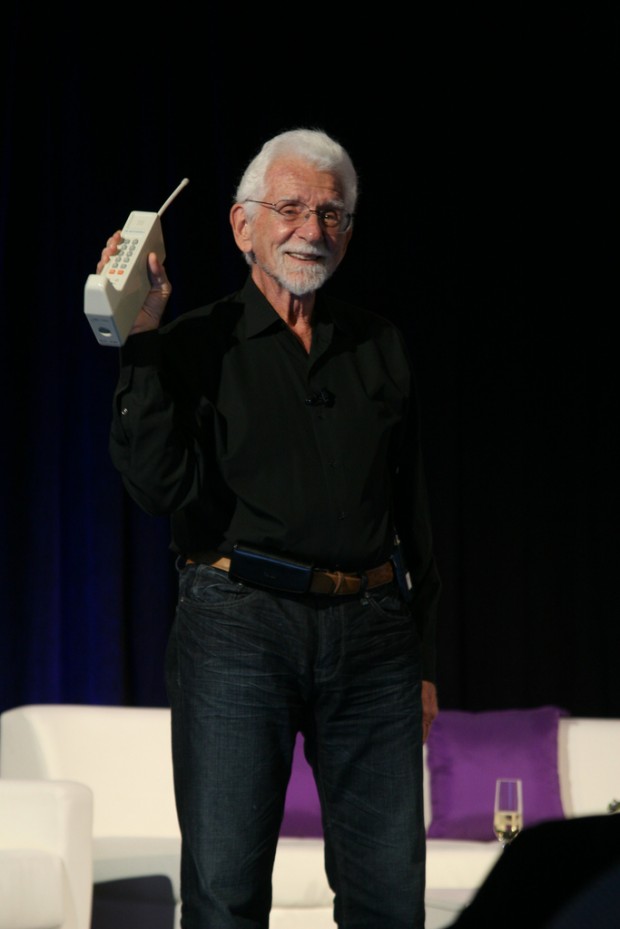Top 20 Facts for 40th Birthday of Cell Phone
The first mobile telephone call was made on April 3, 1973 by Martin Cooper, a former Motorola inventor, who is known as “the father of the cellphone”. We prepare 2o interesting facts about his history for you.


From Sixth Avenue in New York he rang the boss of a rival manufacturer who was less than thrilled to discover that he had lost the race to develop a portable, hand–held device. Cooper later recalled: “There was silence at the other end of the line. I suspect he was grinding his teeth.”
The weight of the phone used to make that call was about the same as a bag of sugar (2lb). The brick–like battery required, which allowed a talk time of just 30 minutes and took 10 hours to charge, made carting it around even more of a chore.
A decade later in 1983 the first mobile phones went on sale in the US costing about £2,500 each. By 1990 there were a million users.
The first mobile phone call made in the UK was in 1985 when comedian Ernie Wise called from London to Vodafone’s offices in Newbury, Berkshire. Mobile phones went on sale here two years later costing £1,200 each and became the must–have gadget of the yuppie. They entered popular culture when Del Boy was seen brandishing one in hit TV series Only Fools And Horses. Nine out of 10 adults in the UK now have a mobile phone.
Voicemail was first added to mobile phones in 1986, followed 10 years later by the first laborious internet access from handsets.
Long before the iPhone there was IBM Simon. Released in 1993 this bulky gadget was the first smartphone and had calendar, fax, touch screen and a host of other features – all for about £500.
The bestselling single model is the Nokia 1100, made in Finland. More than 250million devices were snapped up, also making the phone the top–selling electrical gadget in history, ahead of the PlayStation 2. The phones are still highly sought after on the second–hand market and sales boomed after a false rumour that a software glitch allowed fraudulent bank transactions to be carried out using the device.
Mobile phone texting was first introduced 21 years ago. Neil Papworth, a 22–year–old software programmer from Reading, sent the first message when he wished his friend Richard Jarvis of Vodafone: “Merry Christmas.” At the time mobile phones didn’t have keyboards so it was sent via personal computer.
The first photo to be shared using a mobile phone was taken in 1997 by Philippe Kahn. He sent snaps from the maternity ward where his daughter Sophie was born. Kahn, an inventor from France, is credited with developing the world’s first camera phone.
Celina Aarons, from Florida, is thought to hold the dubious honour of having racked up the highest ever mobile phone bill. She neglected to change her calling plan to an international one when the phone was used for two weeks in Canada. The result was a £142,000 bill, which was later reduced to £1,800 by the phone company.
In the UK a mobile phone is stolen every three minutes. The Metropolitan Police claim that such thefts account for one third such thefts account for one third of all street robberies in London. Inventors are working on the idea of keeping your sim card safe by inserting it into your forearm.
The Sonim XP3300 Force is recognised by the Guinness World Records as the toughest phone. It survived after an 84ft drop on to a layer of concrete without suffering any operational damage.
Drivers’ reactions are a third slower when talking on a handheld mobile than when under the influence of alcohol.
Fake trees and cacti, which are used to conceal mobile phone masts, have become an art form and featured in photographic exhibitions. Following complaints about the appearance of the 40,000 masts in the UK, companies have developed ingenious disguises. Next time you’re out take a closer look at that chimney, clock, drainpipe or weather vane.
The first cell phone to be used by James Bond was an Ericsson JB988 in Tomorrow Never Dies in 1997. The handset contained various fictional extras such as a fingerprint scanner, lock pick, stun gun and remote control for 007’s BMW car.
The world’s most expensive mobile phone carries a £6.7million price tag. The height of luxury or vulgarity, depending on your point of view, it’s a version of the iPhone. The device is made from solid gold, encrusted with 500 diamonds and comes in a platinum box.
Phantom calls to the police are a big problem. Even if a phone is locked emergency calls can still be made accidentally. At one time UK police forces were receiving 11,000 phantom calls a day. In the US two men were caught breaking into a car after one accidentally dialled 911 and officers overheard everything.
The most common use for a mobile is neither calling nor texting but checking the time. This has prompted concerns texting will bring about the death of the wristwatch.
More than 180million iPhones have been sold to date. If you turn them sideways and line them up, they measure more than 12,700 miles. Someone has bothered to work out that’s long enough to build a bridge from Rio de Janeiro to Shanghai, go halfway around the world or circle Pluto almost three times.
Modern devices can weigh less than 3oz and around the world there are now five billion mobile telephones. In the UK the volume of calls from mobile phones first exceeded the volume of calls from fixed phones in 2011. The mobile phone industry is the fastest–growing in the world.
source: Express.co.uk